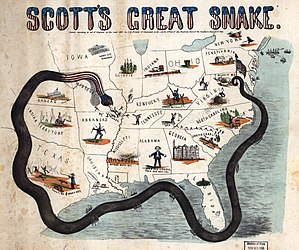I thought the concept of "Robber Baron" was pretty well known to American History Buffs. I did not realize it required further articulation for people to grasp what group to which I am referring. "Rockefeller", "Vanderbilt", "Morgan", are considered prime examples, but my usage of the term should definitely not be limited to just them.

As for "Class Warfare", I have no objections to people getting wealthy by their wits, luck, and hard work, but getting rich through the creation of monopolies, unethical practices and government cronyism, is a different matter all together. If there is a "class" that I find repugnant, it is the criminal class.
Further, your implication that there was no corruption before 1861, and therefore it was Civil War which taught politicians & businesses how to be corrupt, is just laughable.
I didn't say there was no corruption. I said there appears to have been a massive increase in corruption that seems to have began with the Civil War. I conjecture that it is the crony capitalism that initiated the war which redefined the normal way of doing business subsequent to the war.
Indeed, your narrow focus on economic reasons and classes of people suggests an underlying Marxist ideology, and tells us that you are likely on conservative Free Republic as a poser, a false flagger whose real ideology is quite alien here.
My narrow focus on economic reasons (and classes of people) for the war is the consequence of seeing this map which was created by a group called "Dead Confederates.Com" Which I take to mean an anti-confederate group.

This map opened my eyes to what was really going on in the USA prior to the Civil War. From other discussions, I had been made aware that *MOST* of the export value was produced by Southern Products, and the basics of trade informs us that the trade equations must roughly balance, so I had to ask myself, "Why is all that money ending up in New York if the bulk of it is produced from Products exported by the South?"
This did not make any sense to me until I learned of how the laws were jiggered to favor the New England States and New England ships and shipping.
I then realized a bunch of that trade would be effectively shut off and redistributed to Southern ports if the South became a separate nation.
I already knew that Lincoln had gotten quite a lot of financial support for his campaign from Wealthy New Yorkers, and I thought to myself "How would they feel about losing all that trade?" Well, they would be livid! They would be foaming at the mouth angry. So what would they do about it? Why they would demand something be done! It would quickly occur to them that they were in an economic trap for which the only solution was to STOP SOUTHERN INDEPENDENCE!
The only way their financial problems could be remedied was to stop the South from becoming independent, and so I believe they brought every possible pressure to bear on Lincoln in an effort to convince Him to stop the South from forming it's own nation.
It also answered a question that has been puzzling me since high school. "What was the purpose of that blockade"?

For years I thought Lincoln threw up that blockade just to give the Navy something to do. I didn't see how it could have any military significance because those who were going to fight on the side of the South were already there, and they appeared to have all the guns and weapons they needed.
Sure it could affect *TRADE*, but how much effect could it have militarily? Not much that I could see.
But when the Blockade is examined in the light of PREVENTING EUROPEAN PROFITS through trading with the South, it suddenly becomes crystal clear that the blockade was an absolutely critical aspect of the Union War effort.
If European shipping was allowed to see much larger profits than they would ordinarily have received from New York, It would have changed everything. The European governments would have a much larger stake in seeing Southern Independence occur, so that future profits could be locked in.
The Blockade wasn't created for any significant military purpose, it was created entirely for economic reasons. It was created entirely to keep European economic trade from being established with the South, to the detriment of New England Trade.
When you want to know why anything happens, "Follow the Money."